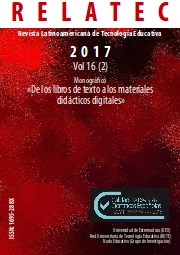The evaluation of digital didactic materials
DOI:
https://doi.org/10.17398/1695-288X.16.2.79Keywords:
Recursos Educativos Digitales, Evaluación de Recursos Educativos Digitales, Libro de texto, Análisis de contenido, Sociedad Digital, Digital Educational Resources, Evaluation of Digital Educational Resources, Textbook, Content Analysis, Digital SocietyAbstract
This paper presents the most relevant findings from a study of the pedagogical and technological characteristics of a sample of digital educational content repositories and platforms currently available in our country for Primary Education from both commercial and public sources. The paper starts with some brief comments on what we consider to be the main aspects of evaluating didactic materials in the context of the digital society.The study methodology consisted of content analysis. A guide-tool was developed for analyzing a sample of didactic materials from three Autonomous Communities (Canary Islands, Galicia and Valencia). A total of 68 digital materials were evaluated. The research results reveal that the didactic materials analyzed present little evidence of innovative strategies and do not fully exploit the potential of ICTs in the design and use of materials. A number of recommendations are made regarding measures to be adopted by institutions and professionals involved in the design and use of digital materials.
Downloads
References
Area, M. (2015). Resumen Memoria Técnica del Proyecto Escuel@ Digital (EDU2015-64593-R). La escuela de la sociedad digital: análisis y propuestas para la producción y uso de los contenidos digitales educativos, financiado por el Plan Estatal de I+D+i. I.P. Manuel Area (Documento oficial, difusión restringida).
Area, M. (2016). Guía de evaluación para el Estudio I. Análisis de la oferta de los recursos educativos en línea para el profesorado de educación Primaria. Guía evaluación Escuel@ Digit@ del Proyecto Escuel@ Digital (EDU2015-64593-R) Versión FINAL, financiado por el Plan Estatal de I+D+i. I. P. Manuel Area (Difusión restringida).
Bardin, L. (2004). Análise de conteúdo. Lisboa: Edições 70
Gómez Mendoza, M. A., Braga García, T. y Rodríguez Rodríguez, J. (2016). Balance y análisis sobre la investigación del texto escolar y los medios digitales. Memorias de la Conferencia Regional para América Latina de la IARTEM. Colombia: Universidad Tecnológica de Pereira.
Kripoedndorff, K. (1990). Metodología del análisis de contenido: teoría y práctica. Barcelona: Paidós
Martínez Bonafé, J. y Rodríguez Rodríguez, J. (2010). El curriculum y el libro de texto. Una dialéctica siempre abierta. En J. Gimeno Sacristán (Coord.), Saberes e incertidumbres sobre el currículum (pp. 246-268). Madrid: Morata
Meneses, J.; Fábregues, S.; Jacovkis, J. y Rodríguez-Gómez, D. (2014). La introducción de las TIC en el sistema educativo español (2000-2010): un análisis comparado de las políticas autonómicas desde una perspectiva multinivel. Estudios de Educación, 27, 63-90. Recuperado a partir de http://www.unav.edu/publicaciones/revistas/index.php/estudios-sobre-educacion/article/view/486
Peirats Chacón, J. y Esnaola Horacer, G. (2015). Digitalización de los contenidos Curriculares. Educatio Siglo XXI, 33(3), 11-14.
Peirats Chacón, J.; Gallardo Fernández, I.M.; San Martín Alonso, A. y Cortés Mollá, S. (2015). Los contenidos curriculares digitalizados: Voces y silencios en el ámbito editorial. Educatio Siglo XXI, 33(3), 39-62.
Reints, A. y Wilkens, H. (2010). Evaluating the quality of textbooks from the perspective of the learning process. En J. Rodríguez Rodríguez, M. Horsley y S. V. Knudsen (Ed). Local, National and Transnational Identities in Textbooks and Educational Media. Tenth International Conference on Textbooks and Educational Media (pp. 467-474). Santiago de Compostela: IARTEM.
Reints, A. y Wikens, H. (2014). The quality of digital learning materials. En Know What Works and Why. Netherlands: Kennisnet / UNESCO-IHE.
Rodríguez, J., Bruillard, E. y Horsley M. (Eds) (2015). Digital Textbooks, What’s New? Santiago de Compostela: IARTEM/Servizo de Publicacións USC. http://www.usc.es/libros/index.php/spic/catalog/book/759
Rodríguez Regueira N. y Rodríguez Rodríguez, J. (2016). Revisión de la investigación publicada sobre el libro digital en Revistas, publicaciones y congresos internacionales de referencia. Profesorado. Revista de Currículum y Formación del Profesorado, 20 (1), 9-31.
Rodríguez Rodríguez, J. y Martínez Bonafé, J. (2016). Libros de Texto y Control del Currículum en el contexto de la sociedad digital. Cad. Cedes, 36 (100), 319-336.
Rodríguez Rodríguez, J. y Álvarez Seone (2017). A investigaçao sobre manuais escolares e materiais curriculares. Revista Lusófona de Educaçao, 36, 9-25.
Rodríguez Rodríguez, J. y Delgado de Paiva, M. (2017). Dificultades de aprendizagem nos manuais e materiais didáticos em Portugal. Educaçao e Pesquisa, 43( 3), 765-784.
Ruiz, J. y Ispizua, M. A. (1989). La descodificación de la vida cotidiana: métodos de investigación cualitativa. Bilbao: Universidad de Deusto
Zapico Barbeito, Mª H. (2012). Presenza, conceptualización e tratamento da vellez no currículo escolar: quimera ou realidade? Tesis de Doctorado. Universidad de Santiago de Compostela.
Downloads
Published
Issue
Section
License
Authors who publish in this journal accept the following conditions:
1. The Author retains copyright in the article. Upon acceptance of the article, the author shall grant to the Publisher the right of first publication of the article. with the dcoument registered with the Creative Commons Attribution-NonCommercial-NoDerivative 4.0 International (CC BY-NC-ND) license, which allows to third parties to use what is published whenever they mention the authorship of the work and the first publication in this journal.
2. Authors can make other independent and additional contractual agreements for the non-exclusive distribution of the article published in this journal (eg, include it in an institutional repository or publish it in a book) provided they clearly indicate that the work was published for the first time in this journal.
3. Authors are allowed and recommended to publish their work on the Internet (for example on institutional or personal pages) before and during the review and publication process, as it can lead to productive exchanges and a greater and faster diffusion of published work (see The Effect of Open Access).









